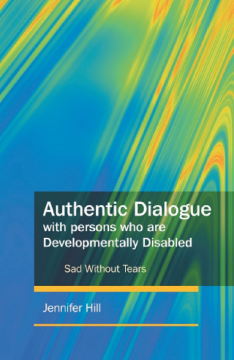
Additional Information
Book Details
Abstract
It has often been assumed that people with developmental disabilities are incapable of expressing or acquiring the level of emotional insight and sensitivity necessary to engage in any kind of therapy. Authentic Dialogue with Persons who are Developmentally Disabled explodes this myth, challenging mental health professionals and families to engage in genuine dialogue with people who are developmentally disabled.
Rather than avoiding painful topics, such as awareness of the loss of a normal life, this book shows it is possible to confront these difficult and emotive issues within a therapeutic environment. The author, Jennifer Hill, follows the progress of several developmentally disabled individuals who participated in her group psychotherapy sessions over the course of several months and were able to discuss their feelings of sorrow, grief, jealousy and joy with the group. Offering rare insight into what it means to have a developmental disability from the perspective of those with the condition, Hill suggests a hopeful alternative to many of the programs currently on offer to the developmentally disabled.
Thought-provoking and refreshing, this book will be of interest to social workers, psychologists, and educators in the fields of developmental disability and mental health, as well as families of individuals with developmental disabilities.
You don't have to be a therapist to gain an enormous amount from this book and it would benefit anyone working with people with a learning disability. In fact, as a lesson on trauma and the capacity for healing, it should resonate with all who work with people with a learning diasability.
Learning Disability Today
The introduction offered a number of insights into the way we interact with the people we work with which made me reconsider some of my interaction strategies...There was plenty of food for thought around preconceptions, dealing with unacceptable behaviour, confronting lying and the potential destructiveness of group dynamics amongs other themes... Overall the book would provide useful guidance for anyone involved in talk-based therapy groups with people with learning disabilities. If also offers some thought-provoking ideas and issues for any professional working in this field, and delivers what it promises in showing people with learning disabiities as capable of fully experiencing and confronting their emotions... A useful and thought-provoking book for anyone offering group sessions to people with learning disabilities.
COTSS PLD Newsletter
Jennifer Hill worked in the field of developmental disabilities for over 20 years before going on to work in aboriginal communities with trauma victims and establishing a private psychotherapy practice. She is currently completing a PhD in Sociology at the University of British Columbia. She has received two awards from the university for outstanding scholarship: the Jean Jure Scholarship and the Henry Maas Memorial Scholarship. Jennifer is also a director for the Who Minds the Child? Media Education Society which promotes the healthy development of children. She lives in the Okanagan Valley in Kelowna in British Columbia, Canada with her husband, Marc Brillinger, and cat, Sylvester.
Table of Contents
| Section Title | Page | Action | Price |
|---|---|---|---|
| Acknowledgements | |||
| Foreword | |||
| Introduction | |||
| The struggle against pesticides | |||
| Russian women's roles in crop protection in the new agricultural economy | |||
| Women in plant protection in Zanzibar | |||
| Establishing gender sensitive IPM: a cowpea programme in Ghana | |||
| Women's roles in crop protection decision making: the case of Atenas County, Costa Rica | |||
| Improving women's participation in pest management training a pilot study in Honduras | |||
| Women in IPM training and implementation in Indonesia | |||
| Women in Vietnam's National IPM Programme | |||
| Gender aspects of IPM for citrus in eastern Bhutan | |||
| Epilogue |
